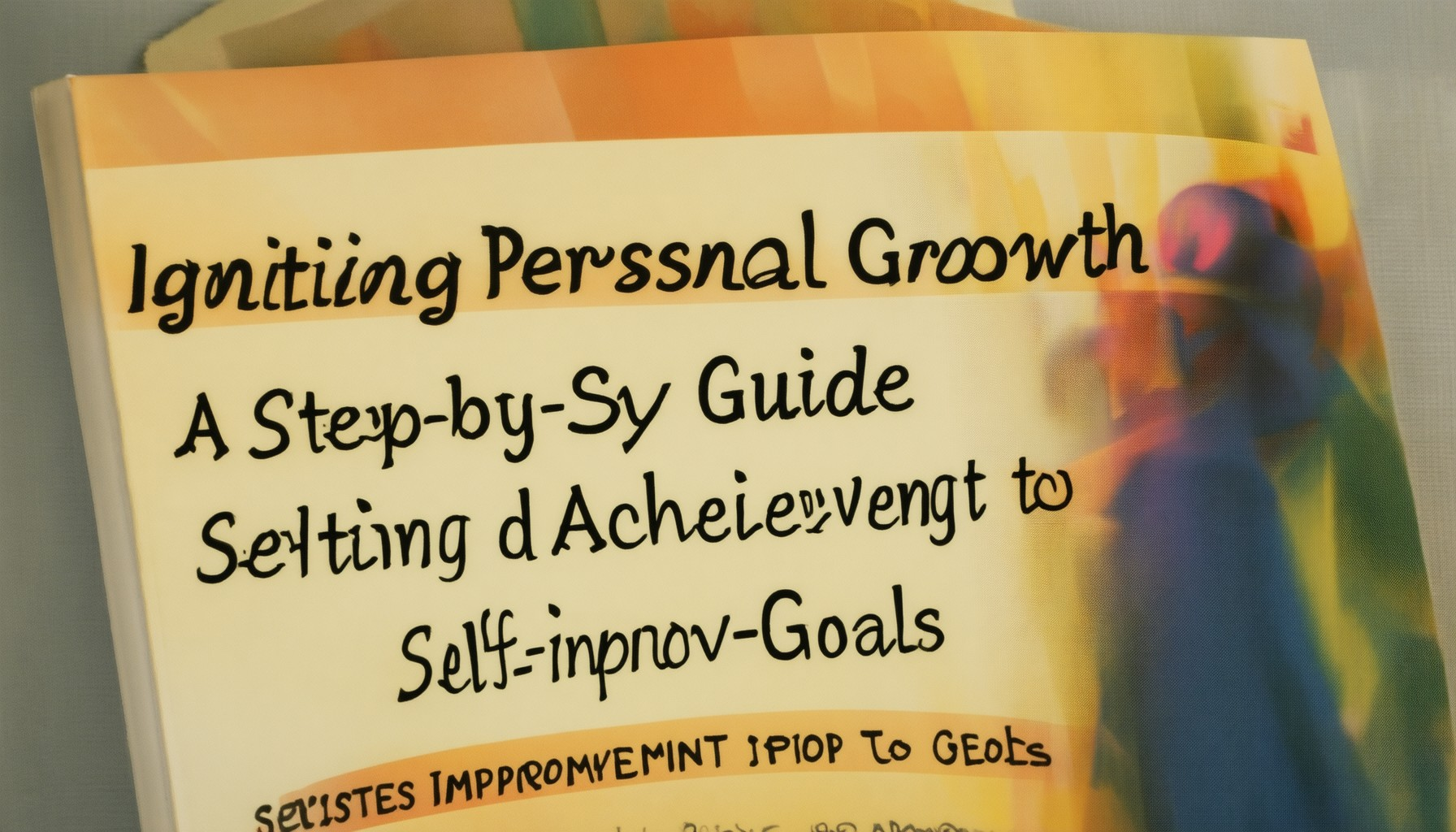Setting self-improvement goals is a powerful way to unlock your potential and drive meaningful change in your life. Whether you’re aiming to enhance your professional skills, foster better habits, or cultivate personal growth, the journey toward self-improvement begins with clarity and purpose. However, many individuals struggle with defining their goals effectively, often feeling overwhelmed by the sheer number of possibilities. This guide offers a structured approach to setting achievable self-improvement goals, equipping you with practical strategies to stay motivated and track your progress. By understanding the key components of effective goal-setting, exploring real-life examples, and learning how to overcome common obstacles, you can embark on a transformative journey toward self-mastery. From establishing SMART objectives to embracing continuous reflection, this comprehensive resource provides everything you need to ignite your personal growth and achieve your aspirations.
Key Takeaways
- Set Clear, Achievable Goals – Use SMART criteria to define your objectives.
- Expand Knowledge – Read books, take courses, and engage in lifelong learning.
- Practice Mindfulness – Use apps like Headspace to improve focus and reduce stress.
- Build Strong Relationships – Schedule regular interactions to foster connections.
- Improve Financial Management – Use tools like Mint to track spending and budgeting.
- Prioritize Physical Health – Incorporate exercise and proper nutrition into your routine.
- Engage in Reading – Join a book club to stay motivated and inspired.
- Seek Purpose – Volunteer regularly to contribute positively to your community.
- Practice Gratitude – Keep a journal to acknowledge positive moments daily.
- Network Strategically – Attend industry events to connect with professionals.
- Minimize Negative Influences – Curate your social media and online presence.
- Constructive Feedback – Listen without defensiveness to gain growth insights.
- Explore New Experiences – Plan trips to broaden your cultural horizons.
- Stay Curious – Engage in discussions to expand your knowledge.
- Celebrate Small Wins – Acknowledge progress to maintain motivation.
- Boost Productivity – Use tools like the Eisenhower Matrix for efficient task management.
- Enhance Mental Well-being – Practice mindfulness and limit stress triggers.
- Improve Physical Health – Start with short exercises and prioritize sleep.
- Strengthen Relationships – Schedule quality time and practice gratitude.
- Limit Screen Time – Designate zones for work and relaxation to reduce mental fatigue.
- Learn Something New – Engage in quick learning sessions to spark curiosity.
What is a Goal for Self-Improvement?
A goal for self-improvement is a purposeful intention aimed at enhancing your personal growth, skills, or overall well-being. These goals are typically specific, measurable, achievable, relevant, and time-bound (SMART), guiding you toward meaningful progress in your life.
Here are 10 effective self-improvement goals to consider:
- Personal Growth : Set a goal to read one book per month from a self-help or personal development genre to expand your knowledge and mindset. Learn More
- Health and Wellness : Commit to exercising three times a week and incorporating more fruits and vegetables into your diet to improve physical health. Healthy Living
- Career Development : Identify a skill or certification you want to acquire by the end of the year to advance your career prospects. Career Growth
- Financial Independence : Save a set percentage of your income each month to work toward financial freedom and long-term security. Budgeting Tips
- Relationship Building : Schedule regular one-on-one meetings with loved ones to strengthen family and friend connections. Building Relationships
- Mental Well-being : Practice mindfulness or meditation for 15 minutes daily to reduce stress and improve emotional resilience. Mental Health Practices
- Creative Expression : Dedicate time to pursue a creative hobby, such as journaling, painting, or music, to explore your artistic side. Creative Projects
- Continuous Learning : Enroll in an online course or attend workshops to stay updated with the latest trends in your field or hobbies. Learning Resources
- Productivity Enhancement : Implement time management techniques to boost efficiency and accomplish more in your day-to-day activities. Productivity Tips
- Community Involvement : Volunteer your time or skills for local community projects to give back and connect with others. Volunteer Opportunities
By setting these goals, you can create a roadmap for personal growth and transformation, leading to a more fulfilling and successful life.
What Are the 5 Points of Personal Development?
- Self-Awareness : Understanding yourself is the foundation of personal development. Identify your strengths, weaknesses, values, and goals. Tools like personality tests and reflection exercises can help you gain insight into your true self.
- Goal Setting : Define clear, achievable goals that align with your passions and aspirations. Use SMART criteria (Specific, Measurable, Achievable, Relevant, Time-bound) to set meaningful objectives and track your progress.
- Continuous Learning : Embrace lifelong learning by pursuing new skills, knowledge, and experiences. Whether through formal education, online courses, or self-study, staying curious and adaptable is key to growth.
- Building Strong Relationships : Develop positive connections with others by practicing effective communication and emotional intelligence. Cultivate empathy, active listening, and trust to foster meaningful relationships.
- Mindfulness and Well-being : Prioritize mental, emotional, and physical health. Practice mindfulness, manage stress, and adopt a balanced lifestyle to enhance overall well-being and resilience.
By focusing on these five pillars, you can create a holistic approach to personal development that leads to greater fulfillment and success. Explore resources like Chris and One for guided exercises and strategies to accelerate your journey.
What is an example of a personal development goal?
One effective personal development goal is to improve time management skills. This goal focuses on enhancing productivity and reducing stress by learning to prioritize tasks and allocate time efficiently.
- Setting Clear Priorities: Begin each day by listing essential tasks and focusing on high-impact activities first.
- Creating a Daily Plan: Allocate specific time slots for work, family, and personal activities to stay organized.
- Avoiding Procrastination: Break larger projects into manageable steps and tackle them incrementally to build momentum.
- Learning Time-Saving Tools: Utilize apps and techniques like the Eisenhower Matrix to streamline workflows and boost efficiency.
By mastering time management, individuals can achieve a better work-life balance and increase overall job satisfaction. To explore more strategies, visit our time management resources and discover how to optimize your daily routine.
How Do I Start Self-Improvement?
To embark on self-improvement, begin by defining clear, achievable goals that align with your aspirations. Use the SMART criteria: Specific, Measurable, Achievable, Relevant, and Time-bound. For instance, aim to read one book per month or exercise three times a week.
Assess your current state by taking personality tests or quizzes to identify your strengths and areas for growth. Tools like the Myers-Briggs Type Indicator can offer valuable insights.
Develop a consistent routine by breaking larger tasks into smaller, manageable steps. For example, commit to a 10-minute walk daily instead of aiming for an hour-long workout immediately.
Expand your knowledge through continuous learning. Dedicate 15-30 minutes daily to online courses or podcasts. Platforms like Coursera and Udemy offer free courses that can accommodate your schedule.
Practice mindfulness and reflection to maintain focus. Use meditation apps like Headspace or Calm to guide your sessions and set reminders to incorporate mindfulness into your day.
Become proactive in building and maintaining relationships. Schedule regular virtual or in-person meetups with friends to foster connections and reduce shyness over time.
Improve financial management by tracking expenses and creating a budget. Utilize apps like Mint to simplify the process and gain better control over your finances.
Prioritize physical health by incorporating moderate exercise into your routine. Find an activity you enjoy, such as walking, stretching, or yoga, and aim for at least 30 minutes most days of the week.
Engage in reading books that inspire personal growth. Consider joining a book club to stay motivated and hold yourself accountable for finishing each book.
Seek purpose by volunteering. Identify a cause you’re passionate about and volunteer regularly with local organizations in your community.
Practice gratitude by keeping a journal. Each morning, jot down three things you’re grateful for to cultivate a positive mindset and boost overall happiness.
Network strategically to advance your career. Attend industry-specific meetups or conferences to connect with professionals and gain insights into your field.
Minimize exposure to negative influences by curating your social media and online presence. Unfollow accounts that drain your energy and focus on content that uplifts and inspires.
Learn to accept and act on feedback constructively. Practice listening without becoming defensive to gain valuable insights and grow from others’ perspectives.
Explore new experiences to broaden your horizons. Plan trips or weekend getaways to destinations you’ve never visited, immersing yourself in different cultures and ways of life.
Stay curious by asking questions and seeking knowledge. Engage in discussions or forums where you can learn from others and expand your understanding of various topics.
Celebrate small achievements to maintain motivation. Acknowledge progress, no matter how minor, to reinforce the habit of improvement and stay committed to your journey.
How Can I Build Myself Better?
To build yourself better, focus on holistic growth across various dimensions of your life. Here’s a structured approach to help you achieve self-improvement:
Mental Growth
- Expand your knowledge through reading books, podcasts, and courses.
- Practice mindfulness and meditation to enhance cognitive function.
- Set personal goals and track your progress to foster discipline.
- Engage in creative activities to stimulate your mind and thinking.
Emotional Intelligence
- Cultivate empathy by understanding others’ perspectives.
- Manage stress effectively through techniques like deep breathing and journaling.
- Develop self-awareness by regularly reflecting on your actions and feelings.
- Practice gratitude daily to foster positive emotions.
Physical Health
- Incorporate regular exercise into your routine to boost energy levels.
- Prioritize proper nutrition to fuel your body and mind.
- Get adequate sleep to support overall well-being.
- Stay hydrated to maintain optimal bodily functions.
Career Development
- Set clear professional goals and work towards achieving them.
- Continuously learn new skills to stay competitive in your field.
- Network with professionals to gain insights and opportunities.
- Seek feedback from mentors to identify areas for improvement.
Financial Management
- Create a budget to manage your finances effectively.
- Save consistently to build a financial cushion.
- Invest wisely to grow your wealth over time.
- Regularly review your financial status to adjust strategies.
Social Relationships
- Communicate openly and listen actively to strengthen connections.
- Show kindness and compassion to foster positive interactions.
- Resolve conflicts constructively to maintain harmony.
- Build a support network to lean on during challenging times.
Spiritual Growth
- Explore purpose and meaning in life through reflection.
- Engage in volunteer work to contribute positively to society.
- Practice spirituality or religion if it resonates with you.
- Spend time in nature to reconnect with yourself.
By focusing on these areas, you can create a balanced and fulfilling life. Remember, self-improvement is a journey, and every step forward counts. Take it one day at a time and celebrate your progress along the way.
How to Improve Your Life in 24 Hours
To significantly enhance various aspects of your life in just 24 hours, focus on targeted, actionable steps across key areas:
1. Boost Productivity
- Organize Tasks : Implement the Eisenhower Matrix to prioritize tasks by urgency and importance. Use a simple digital template or app to streamline your task management.
- Set Daily Goals : Create a concise daily planner with 1-3 priority tasks. Allocate specific times for each to maintain focus and structure.
2. Enhance Mental Well-being
- Practice Mindfulness : Dedicate 5-10 minutes each morning and evening to short meditation or breathing exercises. Use guided sessions via apps to ease into the practice.
- Limit Stress Triggers : Identify and minimize exposure to stressors. Schedule breaks away from screens to allow your mind to rest and recharge.
3. Improve Physical Health
- ** Incorporate Short Exercises**: Start with 10-minute walks during breaks or home workouts in the evening. Aim for consistency rather than intensity.
- Stay Hydrated : Set reminders to drink water every hour. Carry a reusable bottle for easy access.
- Prioritize Sleep : Establish a bedtime routine to aim for 7 hours of quality sleep. Turn off devices an hour before bed to promote better sleep hygiene.
4. Strengthen Relationships
- Schedule Quality Time : Plan brief, meaningful interactions with loved ones. Consider virtual meetups or phone calls to maintain connections.
- Practice Gratitude : Keep a daily gratitude journal, noting three things you’re thankful for. This fosters a positive outlook and enhances satisfaction.
5. Limit Screen Time
- Create Dedicated Zones : Assign specific times for work and relaxation free from screen distractions. This helps in maintaining focus and reducing mental fatigue.
6. Focus on Non-Verbal Communication
- Be Attentive in Conversations : Practice active listening by maintaining eye contact and avoiding distractions. This builds stronger connections and understanding.
7. Learn Something New
- Engage in Quick Learning Sessions : Dedicate 15-30 minutes to a course or podcast. This can spark new interests and ideas, boosting confidence and curiosity.
By strategically allocating time and focusing on consistent, small actions, you can create meaningful improvements across various life domains. Track your progress to identify what works best for you, allowing you to build sustainable habits for long-term growth.









0 Comments